Supper Cyclone1999 Response
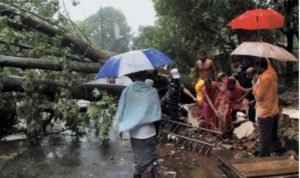 Odisha was battered by a Super Cyclonic Storm on 29 October, 1999 that made landfall near Paradip (43976). The estimated maximum wind speed reached 260-270 kmph in the core area which produced a huge storm surge that led to sea-level elevation of more than 20 feet and took away valuable lives of nearly 10,000 people. It was accompanied with exceptionally heavy rains which led to devastating floods and cut off the State from the rest of the country.
Odisha was battered by a Super Cyclonic Storm on 29 October, 1999 that made landfall near Paradip (43976). The estimated maximum wind speed reached 260-270 kmph in the core area which produced a huge storm surge that led to sea-level elevation of more than 20 feet and took away valuable lives of nearly 10,000 people. It was accompanied with exceptionally heavy rains which led to devastating floods and cut off the State from the rest of the country.
The extent and severity of the destruction caused by the cyclone was unprecedented:
- Approximately 10,000 people lost their lives
- 19 million people living in 18,000 villages in 14 districts of the state were affected by the disaster
- Millions were left homeless with 750,000 houses completely destroyed and a further 1.12 million damaged
- Half a million animals and 1 million poultry were killed
- 1 million hectares of standing winter crops and other horticultural crops were destroyed
- 90 million trees were felled, destroying 95,000 hectares of forest cover which included 18,000 hectares of coastal belt plantations, 30,000 hectares of cashew plantations and 4.5 million coconut trees
- 14,000 water sources were damaged, including 6,000 irrigation points and 8,000 tanks and water harvesting structures
- Surface communications, telecommunications and power supplies suffered extensive damage with thousands of miles of power lines being destroyed leaving one third of the state without power for over a month
- 52,000kms of roads and 12,000 bridges were destroyed
- Health care facilities were destroyed or damaged
- The cyclone upset the already delicate livelihood system of people living in the affected areas, who were mostly marginal farmers:
- Loss crops and livestock devastated farmers and destroyed their livelihoods
- An estimated 18,400 fishing and 21,700 weaver families lost their livelihoods
- Betel vines worth millions of rupees were damaged affecting hundreds of families
- Wage labourers suffered due to a severe setback in all sectors of the rural economy leaving few employment opportunities
Immediate Response
As soon as the fury of the cyclone abated CYSD began relief and rescue work in both urban and rural areas. At the same time it facilitated a collaborative civil society response to the disaster which led to the formation of an alliance of NGO’s and came to be known as the Orissa Disaster Mitigation Mission (ODMM).
Relief to Urban Slums
- Providing food relief through setting up the first community kitchen in the slums
- Helping people salvage materials from the debris to rebuild their homes and distributing polythene sheets to support this activity.
- Facilitating the formation of volunteer groups to clean water sources and drainage lines, distribute halogen tablets and explain how to use them, and to burn carcasses.
- Facilitating the formation of mobile health teams, which treated 11,354 people.
- Volunteers and serving together – see page 3 of report, and other pages for examples of volunteers and community working together
Relief and Rescue in Rural Areas
In rural areas CYSD operated from 19 nodal points to carry out relief and rescue work in 411 affected villages in 6 districts.
Food Relief: Community kitchens were set up in 335 villages providing food relief to 162,942 people.
Salvage and Retrieval Work, such as clearing and cleaning roads and water bodies, removing corpses and carcasses, retrieving school structures and individual houses, and repairing small bridges. These activities improved sanitation and made villages accessible.
Health :
The cyclone brought with it fears of an epidemic, such as cholera. Non-availability of drinking water, prolonged exposure to wind and rain, and lack of food and shelter were all factors responsible for widespread infection. Severe colds, coughs, fever and gastroenteric disorders were reported in most villages. CYSD facilitated the formation of health teams which carried out health check-ups at mobile health camps and at nodal dispensaries. 25,062 patients were treated, 5000 under-five children were treated.
Shelter :
Temporary shelter materials were distributed to needy families. Food support for renovation of shelters under the Food for Work programme (FFW) was also provided, and as such 1,647 thatched houses were built for the most destitute.
Education :
Hunger, homelessness and loss of their everyday life-world, threatened school children with permanent disorientation in cyclone affected areas. With schools destroyed, books lost and parents focused on finding relief, children had nowhere to go. CYSD quickly responded by: Reviving schools by erecting makeshift shades and structures under the FFW programme. 49 schools were thus restarted within weeks of the cyclone. Midday meals were provided for about 1 week in 45 primary and high schools, and until the government resumed interrupted delivery of the Mid Day Meal (MDM) scheme. Book Banks were formed in 246 schools with 10 sets of books provided for each class. In view of loss of study days, examination guides and test papers were also distributed in these schools, and special coaching classes were held in 19 villages. Learning materials were supplied to existing Non Formal Education Centres (NFECs) and women’s groups were helped to establish 16 new NFECs.
Restoration and Rehabilitation :
Once the immediate response and relief work came to an end, CYSD shifted the focus of its support to longer term restoration and rehabilitation. The population in the cyclone-affected areas faced a bleak future and were threatened with endemic food insecurity. Restoring livelihoods was of paramount importance, with agricultural regeneration given top priority.
Relief and Restoration :
- Repairing Agricultural Infrastructure through the Food for Work (FFW) Programme was planned.
- Relief and rescue operations carried out in 411 villages and 13 urban slums
- 366 community kitchens were run in 305 villages and 13 urban slums, benefiting a total of 47,506 households (229,992 people)
- Health check-ups conducted in 411 villages and 13 urban slums, 90 health camps organised and 25,062 patients treated
- 49 makeshift school structures built and 246 schools provided with educational material support
- 139,155 person days of work created through the Food for Work programme
Agriculture Regeneration Programme
Kitchen gardens, summer crop, monsoon crop carried out in 144 villages benefitting 6,000 farming households.

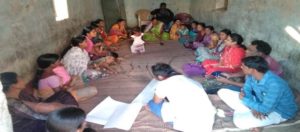 During a panchayat level community monitoring process, it was identified that the pregnant women and lactating mothers are severely malnourished and most of the mothers are identified as high risk mothers (red card holders). Due to lack of appropriate information regarding importance of VHND, they were not attending the VHND sessions regularly. Around 20 per cent beneficiaries did not receive the monetary benefit of JSY and MAMATA scheme even though they are eligible. In this circumstance, a panchayat level action plan was organized by covering all these villages of Nuniapalli panchayat. To grace the occasion, the CDMO, the BDO, CDPO & block chairperson of Agalpur block along with the Sarpanches were called off.
During a panchayat level community monitoring process, it was identified that the pregnant women and lactating mothers are severely malnourished and most of the mothers are identified as high risk mothers (red card holders). Due to lack of appropriate information regarding importance of VHND, they were not attending the VHND sessions regularly. Around 20 per cent beneficiaries did not receive the monetary benefit of JSY and MAMATA scheme even though they are eligible. In this circumstance, a panchayat level action plan was organized by covering all these villages of Nuniapalli panchayat. To grace the occasion, the CDMO, the BDO, CDPO & block chairperson of Agalpur block along with the Sarpanches were called off.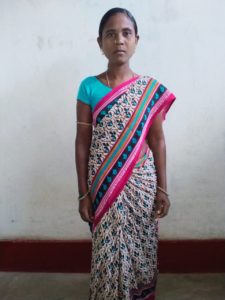 With the intervention of CYSD Child Development Project team and after several rounds of discussions with the community leaders she was allowed to work outside, but she was scared of the isolation. Hence, she got herself engaged in household cultivation and in the fields of her neighbours as agricultural labour. During the last Ravi Season, she was provided with input support, like capacity building, vegetable seeds, Poles, G.I. wires and fencing materials to start intensive vegetable cultivation following Trellis method. She worked hard and abled to manage her family out of the income from vegetable crops.
With the intervention of CYSD Child Development Project team and after several rounds of discussions with the community leaders she was allowed to work outside, but she was scared of the isolation. Hence, she got herself engaged in household cultivation and in the fields of her neighbours as agricultural labour. During the last Ravi Season, she was provided with input support, like capacity building, vegetable seeds, Poles, G.I. wires and fencing materials to start intensive vegetable cultivation following Trellis method. She worked hard and abled to manage her family out of the income from vegetable crops.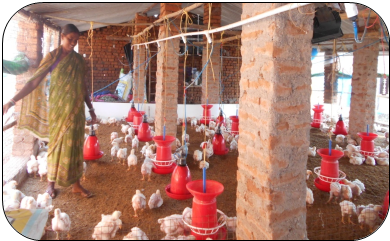 In one of the meetings, the Livelihood Expert of CYSD discussed about the income enhancement plan through duckery and poultry farming. He explained the preventive steps required for the protection of birds from diseases and other essentials, like availability of duck shed, water points, etc. Jamuna made up her mind to get more number of ducklings and develop a farm house for birds. With this intention, she took a loan of Rs,10, 000/- from SHG and bought 200 ducklings. With proper care and protection the ducklings started growing rapidly and after 3-4 months she started selling the ducks. In total she earned a profit of Rs.18000 from the investment of Rs.10000/-.
In one of the meetings, the Livelihood Expert of CYSD discussed about the income enhancement plan through duckery and poultry farming. He explained the preventive steps required for the protection of birds from diseases and other essentials, like availability of duck shed, water points, etc. Jamuna made up her mind to get more number of ducklings and develop a farm house for birds. With this intention, she took a loan of Rs,10, 000/- from SHG and bought 200 ducklings. With proper care and protection the ducklings started growing rapidly and after 3-4 months she started selling the ducks. In total she earned a profit of Rs.18000 from the investment of Rs.10000/-.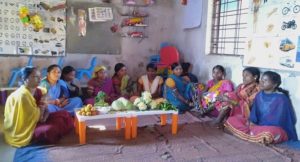 During a plan of action to smoothen the service of Anganwadi centre, the Anganwadi worker explained about the difficulty she is going through in providing the services and issue was considered as a priority subject. However, in the same interface it was decided by the service users that the mothers and adolescent girls will be taking the issue forward and the Ward Member was very spontaneous to help them out in this regard. In the course of action plan, it was commonly agreed that an application is to be submitted to BDO through CDPO for construction of a new Aaganwadi centre with proper and basic facilities. The Adolescent Girls Club took the responsibility to write the application and give it to BDO through ASHA and ANM. As a part of the action plan the application was written by Sanjukta Saraka, a member of the Adolescent Girls Club, and was given to BDO.
During a plan of action to smoothen the service of Anganwadi centre, the Anganwadi worker explained about the difficulty she is going through in providing the services and issue was considered as a priority subject. However, in the same interface it was decided by the service users that the mothers and adolescent girls will be taking the issue forward and the Ward Member was very spontaneous to help them out in this regard. In the course of action plan, it was commonly agreed that an application is to be submitted to BDO through CDPO for construction of a new Aaganwadi centre with proper and basic facilities. The Adolescent Girls Club took the responsibility to write the application and give it to BDO through ASHA and ANM. As a part of the action plan the application was written by Sanjukta Saraka, a member of the Adolescent Girls Club, and was given to BDO.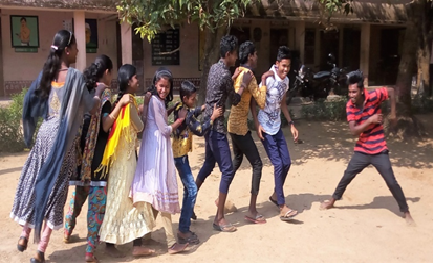 Within the two and half years of intervention, the programme team has observed that cases like illegal migration of children to other states, early marriage, sexual abuse/harassment, sexual exploitation and child labor are rampant in Malkangiri. As per National Family Health Survey (NFHS), Malkangiri district accounts for the highest rate of child marriages in the State where 39.3 percent of girls are married off before they attain the legal age of 18 years. Because of huge school dropouts & irregular education in the district, children and young girls are falling in the trap of marriage, migration, child labor, exploitation & sexual abuse. CYSD realized that these issues can only be tackled in a strategic manner, especially close coordination of the community, administration and civil society organizations. So the organisation started its intervention in 9 GPs under 3 blocks of Malkangiri by organizing children, youth and elders at the community level and established networking and coordination with district child protection unit as well as likeminded CSOs at the district level.
Within the two and half years of intervention, the programme team has observed that cases like illegal migration of children to other states, early marriage, sexual abuse/harassment, sexual exploitation and child labor are rampant in Malkangiri. As per National Family Health Survey (NFHS), Malkangiri district accounts for the highest rate of child marriages in the State where 39.3 percent of girls are married off before they attain the legal age of 18 years. Because of huge school dropouts & irregular education in the district, children and young girls are falling in the trap of marriage, migration, child labor, exploitation & sexual abuse. CYSD realized that these issues can only be tackled in a strategic manner, especially close coordination of the community, administration and civil society organizations. So the organisation started its intervention in 9 GPs under 3 blocks of Malkangiri by organizing children, youth and elders at the community level and established networking and coordination with district child protection unit as well as likeminded CSOs at the district level.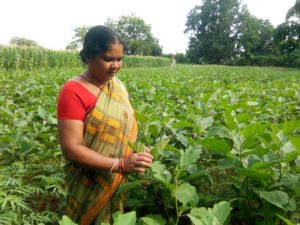 Kasturi lives in Bhairanibeda, a remote village in Khandabandha GP under Thakurmunda block of Mayurbhanj district with her husband, one son and one daughter. Her family was leading a miserable life in spite of having around 4.5 acres of cultivable land. Five years ago, both the husband and wife were doing daily labor and sometimes collecting Sal leaf to stitch plates, but the total income was hardly meeting their family needs. But, Kasturi had a special interest on vegetable cultivation from her childhood. After completion of 10th Standard education, she used to support her father and brother in vegetables cultivation.
Kasturi lives in Bhairanibeda, a remote village in Khandabandha GP under Thakurmunda block of Mayurbhanj district with her husband, one son and one daughter. Her family was leading a miserable life in spite of having around 4.5 acres of cultivable land. Five years ago, both the husband and wife were doing daily labor and sometimes collecting Sal leaf to stitch plates, but the total income was hardly meeting their family needs. But, Kasturi had a special interest on vegetable cultivation from her childhood. After completion of 10th Standard education, she used to support her father and brother in vegetables cultivation.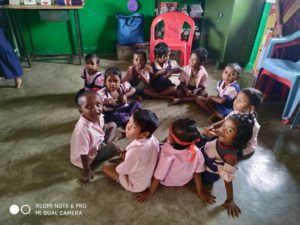 As part of Community monitoring, a village level interface was organized between the service providers and service users where Ward Member of that village was also present. During a plan of action to smoothen the service of Anganwadi Centre, the Anganwadi Worker explained about the difficulties she is passing through in providing the services. However, in the same meeting it was decided by the service users that the mothers will take the issue forward, and the ward member was very enthusiastic to help them out in this regard. Within a week the ward member wrote an application and the mother participants endorsed to take it up to the appropriate authority. Then they submitted the application to the CDPO and BDO of Boipariguda block and continuously made follow up and negotiated with them to sanction a new Anganwadi Center.
As part of Community monitoring, a village level interface was organized between the service providers and service users where Ward Member of that village was also present. During a plan of action to smoothen the service of Anganwadi Centre, the Anganwadi Worker explained about the difficulties she is passing through in providing the services. However, in the same meeting it was decided by the service users that the mothers will take the issue forward, and the ward member was very enthusiastic to help them out in this regard. Within a week the ward member wrote an application and the mother participants endorsed to take it up to the appropriate authority. Then they submitted the application to the CDPO and BDO of Boipariguda block and continuously made follow up and negotiated with them to sanction a new Anganwadi Center.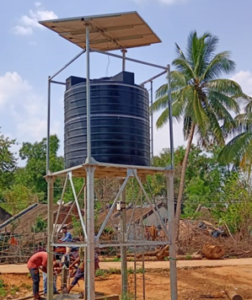 Rounds of combined meetings of CYSD team, VWSC and youth group were conducted to arrange resources for bringing a tangible solution to the above issue. The VWSC members and youth group were facilitated to write an application to the Block Development Officer (BDO) through J.E, RWSS for installation of a solarised pump set in the community, thinking the administration would sort out their problem. The VWSC members regularly made follow up with the block administration for the same. Within a short period of time the construction work was started by youth group of the village, with due approval and financial sanction from the concerned BDO for installation of solarised pump-set in the village.
Rounds of combined meetings of CYSD team, VWSC and youth group were conducted to arrange resources for bringing a tangible solution to the above issue. The VWSC members and youth group were facilitated to write an application to the Block Development Officer (BDO) through J.E, RWSS for installation of a solarised pump set in the community, thinking the administration would sort out their problem. The VWSC members regularly made follow up with the block administration for the same. Within a short period of time the construction work was started by youth group of the village, with due approval and financial sanction from the concerned BDO for installation of solarised pump-set in the village.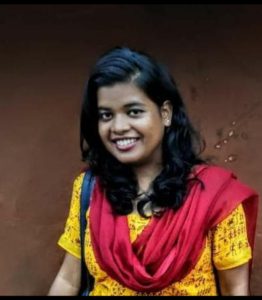 Stitha Prajna, a girl from a normal middle class family of Jagatsinghpur district completed her graduation in Agricultural Engineering from OUAT and later Agribusiness Management also. Like all other girls she was also in search of a suitable job and was looking for the opportunities. After some days she also managed to find a kind of work for herself which was suited her skill base i.e. agriculture.
Stitha Prajna, a girl from a normal middle class family of Jagatsinghpur district completed her graduation in Agricultural Engineering from OUAT and later Agribusiness Management also. Like all other girls she was also in search of a suitable job and was looking for the opportunities. After some days she also managed to find a kind of work for herself which was suited her skill base i.e. agriculture.